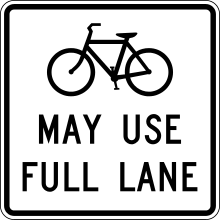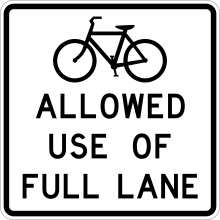Bicycles May Use Full Lane

The Bicycles May Use Full Lane sign, also referred to as BMUFL or R4-11, is a traffic sign used in the United States to:
- designate roads with lanes that are too narrow to be safely shared side-by-side by a bicycle and another vehicle to indicate that bicyclists may occupy the full lane to discourage unsafe within-lane passing
- encourage bicyclists to use the full lane to discourage unsafe within-lane passing
- encourage motorists to change lanes to pass bicyclists
- warn motorists that bicyclists may be using the full lane
The sign consists of a graphic image of a bicycle, followed by the words, "May Use Full Lane".

BMUFL was first specified in Chapter 9B of the 2009 Manual on Uniform Traffic Control Devices, and was replaced with the Bicycles Allowed Use of Full Lane sign (R9-20) in the 11th Edition in 2023.[1]
Sign effectiveness
A study conducted by the City of Austin in 2010 showed that placement of BMUFL signs influenced cyclists to generally ride farther from the curb (an average of 0.31 ft [94 mm]),[2] and drivers moved further left as they passed bikes after the signs were installed, such that the percentage of motorists who passed within 3 feet (0.91 m) of the bicyclist dropped from 44% to 0%.[3]
Guidance for placement
The 2012 edition of the California Manual on Uniform Traffic Control Devices indicates that the Bicycles May Use Full Lane Sign be used "where travel lanes are too narrow for bicyclists and motor vehicles to operate side by side" to "inform users that bicyclists might occupy the travel lane":[4]
Section 9B.06 Bicycles May Use Full Lane Sign (R4-11)
- Option:
- 01 The Bicycles May Use Full Lane (R4-11) sign may be used on roadways where no bicycle lanes or adjacent shoulders usable by bicyclists are present and where travel lanes are too narrow for bicyclists and motor vehicles to operate side by side.
- 02 The Bicycles May Use Full Lane sign may be used in locations where it is important to inform road users that bicyclists might occupy the travel lane.
- 03 Section 9C.07 describes a Shared Lane Marking that may be used in addition to or instead of the Bicycles May Use Full Lane sign to inform road users that bicyclists might occupy the travel lane.
- Support:
- 04 The Uniform Vehicle Code (UVC) (Also refer to CVC 21202(a)(3)) defines a “substandard width lane” as a “lane that is too narrow for a bicycle and a vehicle to travel safely side by side within the same lane.”
Bicycle May Use Full signs are not approved for use in Michigan according to the September 2013 Edition of the Michigan Manual on Uniform Traffic Control Devices since they are "not applicable" under state law.[5]
Early Installations
California
In 2012, the City of Encinitas, California installed shared lane markings and Bicycles May Use Full Lane signs along Coast Highway 101 to "alert motorists that cyclists have the legal right to take the lane".[6]
Florida
The Bicycles May Use Full Lane Sign was adopted for use by the Florida Department of Transportation in January, 2011. By March 17, 2012 the signs were installed in at least three locations.[7]
Kentucky
In July 2012, 31 Bicycles May Use Full Lane signs were installed in Louisville, Kentucky. Dirk Gowin, an engineering project coordinator with the Louisville Metro Department of Public Works & Assets, points out that to accommodate a car and bicycle safely side-by-side within a lane, the lane would have to be "13 or 14 feet wide". The signs were installed on roads like River Road, with lanes from 11 to 12 feet in width.[8]
Maine
Bicycles May Use Full Lane signs were installed on William Clarke Drive in Westbrook in 2011,[9] and since then have been used in multiple places in Portland, including sections of Outer Congress Street and St. John Street.
Maryland
Twenty Bicycles May Use Full Lane signs were installed by the City of Baltimore in 2012.[10]
After 600 cyclists objected to an initial decision to reject the sign[citation needed], in 2012, the Maryland State Highway Administration posted Bicycles May Use Full Lane signs along Maryland Route 953 in Glenn Dale, and announced plans to post more such signs in Montgomery and Prince George's counties.[11]
Minnesota
Bicyclists May Use Full Lane signs were first installed in Minnesota in 2011, including on a downhill section of Marshall Avenue in St. Paul "where the travel lane is less than 14′ wide".[12]
Missouri
Bicycles May Use Full Lane signs were installed on Florissant Rd. in Ferguson, Missouri in 2012.[13][unreliable source][14]
Vermont
Bicycles May Use Full Lane signs were installed in 2012 on multiple streets in Burlington, VT including North Ave., Riverside Ave., Pine St. and Shelburne Rd.[15]
References
- ^ "Part 9, Traffic Control for Bicycle Facilities" (PDF). MUTCD 11th Edition. National Highway Traffic Safety Administration. December 19, 2023. p. 1161. Retrieved December 19, 2023.
02 The Bicycles Allowed Use of Full Lane (R9-20) sign (see Figure 9B-1) may be used on roadways where no bicycle lanes or adjacent shoulders usable by bicycles are present and where travel lanes are too narrow for bicycles and motor vehicles to operate side-by-side. 03 The Bicycles Allowed Use of Full Lane sign may be used in locations where it is important to inform road users that bicyclists might occupy the travel lane.
- ^ "Effects of "Bicycles May Use Full Lane" Signs on Bicyclist and Motorist Behavior along Multi-Lane Facilities". California Active Transportation Safety Information Pages (CATSIP). June 18, 2010. p. 5. Archived from the original on 2015-05-22. Retrieved May 19, 2015.
The results of this study suggest that "Bicycles May Use Full Lane" signs do improve bicyclist and motorist safety along routes where commuter bicyclists are common users of the facility.
- ^ "Effects of "Bicycles May Use Full Lane" Signs on Bicyclist and Motorist Behavior along Multi-Lane Facilities". California Active Transportation Safety Information Pages (CATSIP). June 18, 2010. p. 15. Archived from the original on 2015-05-22. Retrieved May 19, 2015.
After the sign installation, the proportion of motorists who passed within 3 feet of a bicyclist decreased from 44% to 0%.
- ^ "Part 9, Traffic Control for Bicycle Facilities" (PDF). California MUTCD 2012 Edition. California Department of Transportation. January 1, 2012. p. 1354. Archived from the original on February 13, 2014. Retrieved June 23, 2022.
01 "The Bicycles May Use Full Lane (R4-11) sign may be used on roadways where no bicycle lanes or adjacent shoulders usable by bicyclists are present and where travel lanes are too narrow for bicyclists and motor vehicles to operate side by side. 02 The Bicycles May Use Full Lane sign may be used in locations where it is important to inform road users that bicyclists might occupy the travel lane."
{{cite web}}: CS1 maint: unfit URL (link) - ^ "Michigan Manual on Uniform Traffic Control Devices" (PDF). Michigan Department of Transportation. September 2013. p. 794. Retrieved January 21, 2018.
- ^ McCray, Tawny Maya (June 14, 2012). "Panel OK's New Bike Markings in Leucadia". San Diego Union-Tribune. Retrieved September 27, 2013.
The addition of sharrows and signage along Coast Highway 101 would simply alert motorists that cyclists have the legal right to take the lane
- ^ Martin, George (March 17, 2012). "Bicycles May Use Full Lane Signs". Florida Bicycle Law. Retrieved October 1, 2013.
- ^ Hagedorn, Emily (September 9, 2013). "Bike signs on River Road stir debate". courier-journal.com. Gannett. Retrieved October 1, 2013.
- ^ "New signs point way for Westbrook bicyclists". Keep Me Current. September 21, 2011.
- ^ "Where Noted, Cyclists Use of Full Lane Now Legal in MD". Citizens Planning & Housing Association, Inc. November 7, 2012. Retrieved October 1, 2013.
The Maryland Department of Transportation (MDOT) has begun to install special signs, called R4-11 signs, around the state, which read: "NOTICE: BICYCLES MAY USE FULL LANE." Better yet, there are already twenty such signs installed in Baltimore City.
- ^ Titus, Jim (August 1, 2012). "New Maryland signs emphasize cyclists' right to the road". Greater Greater Washington. Retrieved September 27, 2013.
- ^ Clark, Steve (May 2, 2011). "What? Bicyclists May Use Full Lane?". Bike Walk Twin Cities. Archived from the original on October 5, 2013. Retrieved October 3, 2013.
- ^ "2012-11-16: New "Bikes May Use Full Lane" signs in Ferguson to aid cyclists". wordpress.com. ThinkBicycling. November 16, 2012. Retrieved September 27, 2013.
- ^ Noll, Gerry (November 2012). "NOVEMBER 2012". Ferguson Cycling Club. Archived from the original on 2013-10-02. Retrieved September 30, 2013.
BMUFL = "Bicycles May Use Full Lane". Two signs with that message popped up recently on South and North Florissant Roads. If you haven't seen them yet they are right at the borders of Ferguson in either direction. The accompanying photo shows the sign at the south city limits along with a bicyclist (me!) using the full lane.
- ^ Sheketoff, Melissa (July 5, 2012). "Burlington road signs: cars and bikes must share the road". WCAX. Archived from the original on July 11, 2012. Retrieved December 1, 2013.
External links
- CS1 maint: unfit URL
- All articles with unsourced statements
- Articles with unsourced statements from May 2015
- All articles lacking reliable references
- Articles lacking reliable references from September 2013
- Cycling in the United States
- Cycling safety
- Manual on Uniform Traffic Control Devices
- Vehicular cycling